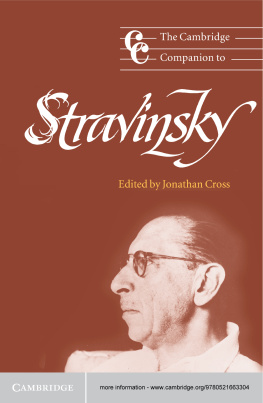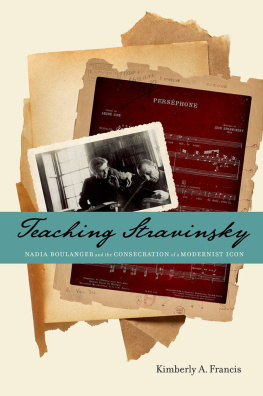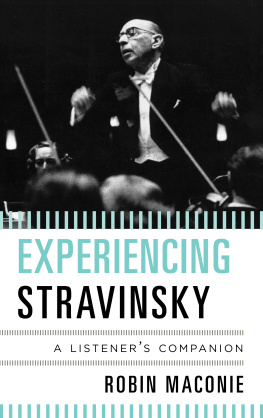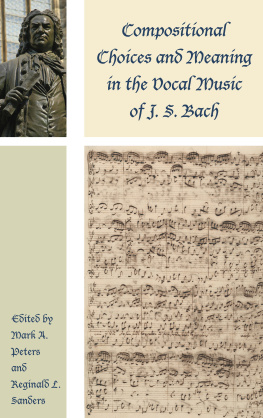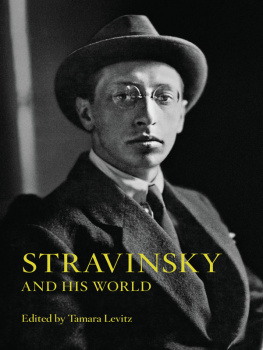The Cambridge Companion to Stravinsky
Stravinskys work spanned the major part of the twentieth century and engaged with nearly all its principal compositional developments. This Companion reflects the breadth of Stravinskys achievement and influence in essays by leading international scholars on a wide range of topics. It is divided into three parts dealing with the contexts within which Stravinsky worked (Russian, modernist and compositional), with his key compositions (Russian, neoclassical and serial) and with the reception of his ideas (through performance, analysis and criticism). The volume concludes with an interview with the leading Dutch composer Louis Andriessen and a major re-evaluation of Stravinsky and us by Richard Taruskin.
JONATHAN CROSS is University Lecturer in Music and Tutorial Fellow of Christ Church, Oxford. He is author of The Stravinsky Legacy (Cambridge, 1998) and Harrison Birtwistle: Man, Mind, Music (London, 2000), and is Editor of the journal Music Analysis.
Cambridge Companions to Music
Composers
The Cambridge Companion to Bach
Edited by John Butt
The Cambridge Companion to Bartk
Edited by Amanda Bayley
The Cambridge Companion to Beethoven
Edited by Glenn Stanley
The Cambridge Companion to Benjamin Britten
Edited by Mervyn Cooke
The Cambridge Companion to Berg
Edited by Anthony Pople
The Cambridge Companion to Berlioz
Edited by Peter Bloom
The Cambridge Companion to Brahms
Edited by Michael Musgrave
The Cambridge Companion to John Cage
Edited by David Nicholls
The Cambridge Companion to Chopin
Edited by Jim Samson
The Cambridge Companion to Debussy
Edited by Simon Trezise
The Cambridge Companion to Handel
Edited by Donald Burrows
The Cambridge Companion to Ravel
Edited by Deborah Mawer
The Cambridge Companion to Schubert
Edited by Christopher Gibbs
The Cambridge Companion to Stravinsky
Edited by Jonathan Cross
Instruments
The Cambridge Companion to Brass Instruments
Edited by Trevor Herbert and John Wallace
The Cambridge Companion to the Cello
Edited by Robin Stowell
The Cambridge Companion to the Clarinet
Edited by Colin Lawson
The Cambridge Companion to the Organ
Edited by Nicholas Thistlethwaite and Geoffrey Webber
The Cambridge Companion to the Piano
Edited by David Rowland
The Cambridge Companion to the Recorder
Edited by John Mansfield Thomson
The Cambridge Companion to the Saxophone
Edited by Richard Ingham
The Cambridge Companion to Singing
Edited by John Potter
The Cambridge Companion to the Violin
Edited by Robin Stowell
Topics
The Cambridge Companion to Pop and Rock
Edited by Simon Frith, Will Straw and John Street
The Cambridge Companion to Jazz
Edited by Mervyn Cooke and David Horn
The Cambridge Companion to Blues and Gospel Music
Edited by Allan Moore
The Cambridge Companion to the Orchestra
Edited by Colin Lawson
The Cambridge Companion to
STRAVINSKY
.................
EDITED BY
Jonathan Cross

CAMBRIDGE UNIVERSITY PRESS
Cambridge, New York, Melbourne, Madrid, Cape Town, Singapore, So Paulo
Cambridge University Press
The Edinburgh Building, Cambridge CB2 8RU, UK
Published in the United States of America by Cambridge University Press, New York
www.cambridge.org
Information on this title: www.cambridge.org/9780521663304
Cambridge University Press 2003
This publication is in copyright. Subject to statutory exception and to the provisions of relevant collective licensing agreements, no reproduction of any part may take place without the written permission of Cambridge University Press.
First published 2003
Reprinted 2005
A catalogue record for this publication is available from the British Library
ISBN 978-0-521-66330-4 hardback
ISBN 978-0-521-66377-9 paperback
Transferred to digital printing 2008
Contents
Rosamund Bartlett
Christopher Butler
Arnold Whittall
Anthony Pople
Kenneth Gloag
Martha M. Hyde
Jonathan Cross
Joseph N. Straus
Nicholas Cook
Max Paddison
Craig Ayrey
Stuart Campbell
Louis Andriessen and Jonathan Cross
Richard Taruskin
Contributors
Louis Andriessen is one of the most distinguished living Dutch composers. He teaches composition at the Koninklijk Conservatorium Den Haag.
Craig Ayrey is Lecturer in Music Theory and Analysis at Goldsmiths College, University of London.
Rosamund Bartlett is Lecturer in Russian and Music History at the University of Durham.
Christopher Butler is Professor of English at the University of Oxford and Tutorial Fellow of Christ Church.
Stuart Campbell is Honorary Senior Research Fellow in the Institute of Central and Eastern European Studies and the Department of Music at the University of Glasgow.
Nicholas Cook is Research Professor in Music at the University of Southampton.
Jonathan Cross is University Lecturer in Music and Tutorial Fellow of Christ Church, Oxford.
Kenneth Gloag is Lecturer in Music at Cardiff University.
Anthony Gritten is Lecturer in Music at the University of East Anglia.
Martha M. Hyde is Professor of Music at the State University of New York at Buffalo.
Max Paddision is Professor of Music at the University of Durham.
Anthony Pople is Professor of Music at the University of Nottingham.
Joseph N. Straus is Professor of Music at Queens College and the Graduate Center, City University of New York.
Richard Taruskin is Professor of Music at the University of California at Berkeley.
Arnold Whittall is Professor Emeritus of Music Theory and Analysis at Kings College London.
ANTHONY GRITTEN
Chronology of Stravinskys life and works
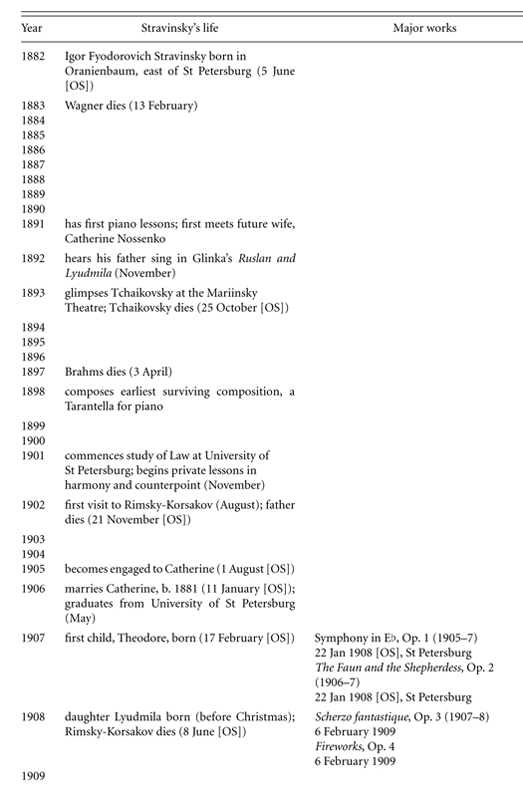
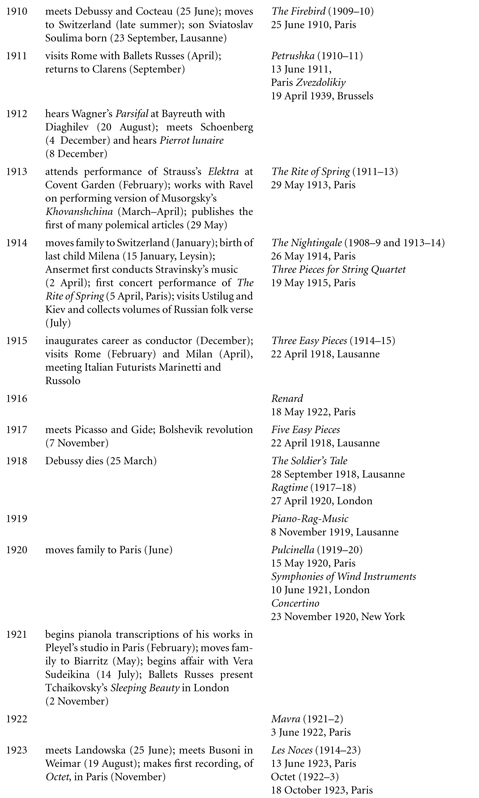
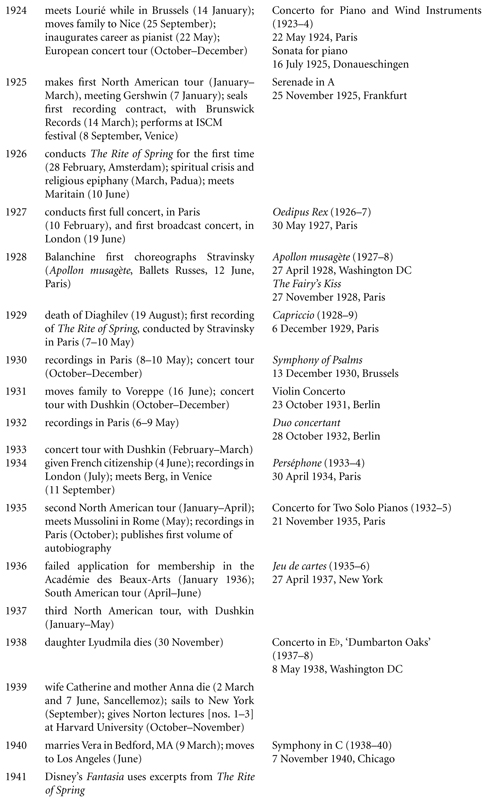
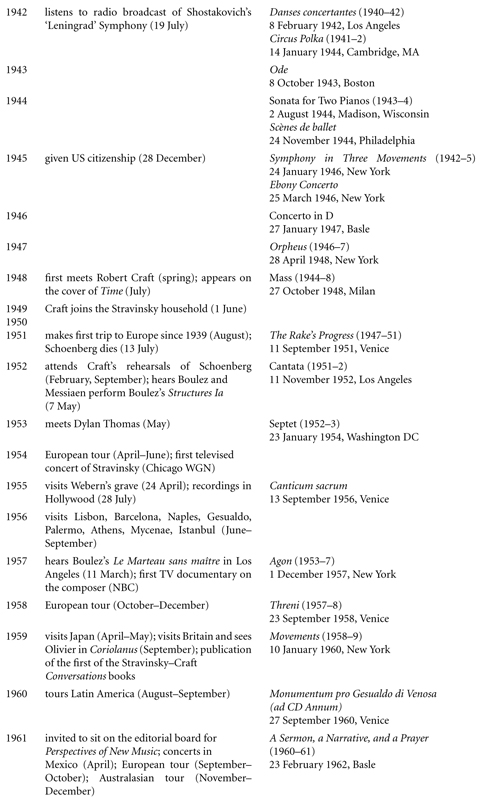
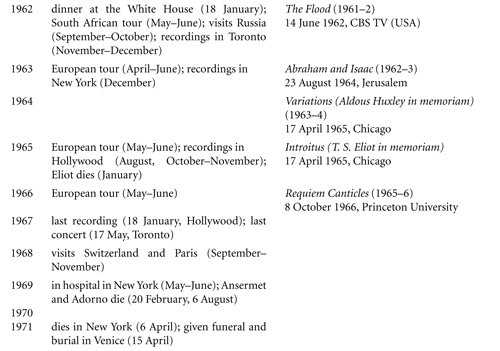
Notes:
1 Works are listed in the year of their completion.
2 Dates of premieres are of the first public complete performance of the principal version of the work.
Preface and acknowledgements
Born in the nineteenth century, Stravinsky became one of the dominant creative figures of the twentieth, and his influence is still strongly felt into the twenty-first. The contributions to this volume reflect the range of Stravinskys impact on many aspects of current musical and musicological life. They offer a broad spectrum of historical, critical and interpretative approaches to the composer and his music: Stravinsky the Russian, the modernist, the neoclassicist, the serialist, the dramatist. The chapters also look at the fascinating ways in which Stravinsky and his ideas have been received by performers, critics, analysts and composers. The final chapter proposes that the twentieth century was indeed Stravinskys century and that a Stravinskian attitude pervades much recent musical thought and practice.
Next page
